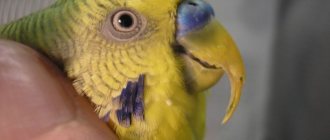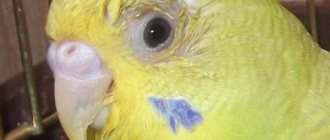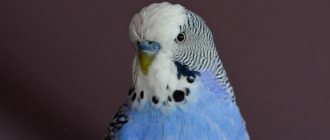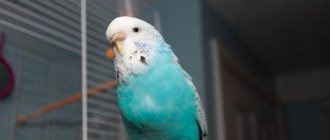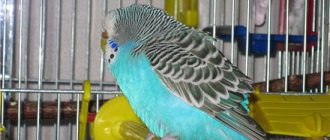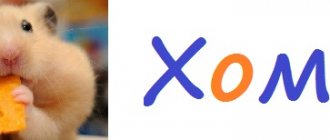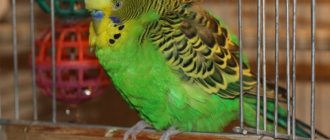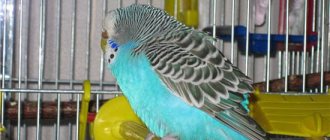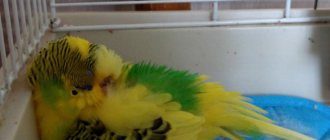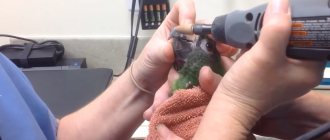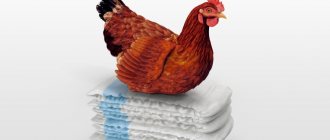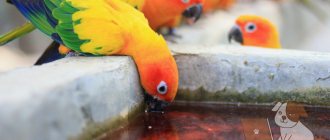Surely, many of you, dear readers, have repeatedly seen on TV advertisements for various drugs that promise to quickly help with bloating and nausea.
These are quite common ailments, from which even completely healthy people can occasionally suffer.
Oddly enough, our feathered friends are also susceptible to these problems, despite their small size and very fast metabolism.
Visually, this looks quite creepy, because the parrot’s belly can significantly increase in size, which often causes panic in its owner.
And if you also take into account that other health problems may appear at the same time, then all this can result in very serious problems.
- Why can parrots have a bloated stomach?
- Abdominal bloating syndrome as a manifestation of a tumor
Poisoning
It is possible to understand that a bird is poisoned by the following signs:
- The parrot's belly is swollen;
- He becomes disheveled and unkempt;
- The bird weakens and completely refuses food.
There are also several reasons for poisoning. The bird can become intoxicated due to poor quality feed. Perhaps the parrot was flying in an unfamiliar place and ate something nasty (cigarette butts or soap). New indoor plants (euphorbia, fern, ivy, azalea and many others) can cause poisoning in the body. During preventive treatment of birds against insects, minor intoxication is possible.
In case of poisoning, in order not to worsen the health of the singing “family member”, first aid must be provided. To do this, introduce into the beak through a pipette any absorbent diluted with water, which will be at home. You can take activated carbon, Filtrum or Enterosgel. One adult needs no more than 1 ml of the drug.
Why is the parrot unkempt and trembling?
Any changes in your pet's behavior, for example, when he unnaturally spreads his wings, often closes his eyes and sits motionless at the bottom of the cage for a long time, have a reason.
Such conditions can be provoked either by errors in the conditions of maintenance and care, or by illness of the parrot.
No concern
A bird experiences fear - this is the very first thing that comes to mind when you notice that a bird is trembling and twitching its wings. This state is especially typical for those who are in the process of adaptation - the parrot is in your house for the first time and is afraid of everything. Not surprisingly, new people, sounds and environments make him fearful.
During this period, there is no need to frighten him with your constant presence, attempts to play, caress him. Let him get used to the new place. Talk to him in a quiet voice, kindly. If you see that something in the cage irritates your pet (a toy, feeder or sippy cup that is unusual for her), remove them so as not to irritate him even more. Gradually the parrot will calm down and stop shaking.
At this time, you should also not let him out of the cage. Without calmly examining the situation, he may run into a piece of furniture, a mirror or window glass and injure himself.
Sharp and loud sounds can greatly frighten the bird, so do not turn on the TV too loudly and do not speak in a raised voice in the room with the parrot.
Stress can cause the appearance of a new pet in the house (especially if it is a cat or dog), or a small child. They make a lot of noise, frighten with sudden movements, and ineptly holding the bird in their arms. Of course, seeing such neighbors, the parrot begins to tremble. If you see his wings shaking, analyze who or what might have scared him. Explain to your children that pets must be handled with care; they are living beings, not toys.
Lipoma
This is a benign tumor that occurs in birds at a more mature age (in the second half of life). Bloating in a budgerigar is one of the signs of the disease. Lipoma often occurs in birds that are sedentary, lazy and have a monotonous routine. They have a greater predisposition to obesity due to poor lifestyle and overeating.
In the initial stages, lipoma fatty nodules are small in size, so parrot owners do not attach importance to their appearance. And they make a mistake. After all, fatty formations will only grow and can reach such sizes that the bird can hardly move or exist at all. Lipoma is not only an aesthetically unsightly neoplasm, it puts pressure on internal organs, preventing them from working properly.
There is only one treatment in the initial stages - a balanced diet, diet and exercise. If the disease is advanced, surgical intervention is inevitable.
Oncology in parrots
To clarify the diagnosis, it is necessary to take the affected tissue for histology. If the cancer etiology of the neoplasm is confirmed, drug therapy is carried out. Treatment allows you to slow down the pathological process. If the diagnostic results reveal a hormonally active tumor in the fibrin sheath (capsule), then the bird is chemically castrated to prevent growth of the tumor.
Oncology in a parrot
Do not allow the parrot to breed, avoid overheating and direct sunlight on the cage. Don't give wheat germ, eggs, cottage cheese, vitamins anymore. Older birds have a better chance of surviving cancer because they are past reproductive age.
Parrots can have a swollen belly photo
Colds
No matter how strange it may sound, domestic parrots, even though they are in “greenhouse” conditions, are more likely to catch a cold than free birds. When kept indoors, fragile pets react more strongly to changes in temperature and humidity and are very afraid of drafts. An open window in hot summer weather is one of the common causes of colds.
Many parrots love to bathe and get this opportunity quite often. However, after water treatments, the bird does not always have time to dry, especially in a cool room, so it catches a cold.
Cold symptoms:
- sneezing;
- runny nose;
- cough;
- chills.
Sneezing is accompanied by discharge from the nostrils; in addition, the parrot feels itching in the respiratory tract and often scratches the wax with its claws. The body temperature rises, trembling appears, the bird tries to warm up and hides its beak in its feathers. The general condition is deteriorating, which affects activity: the feathered pet does not fly or jump, but sits in the corner of the cage, huddled into a ball, conserving energy.
Oviduct blockage
A distended abdominal cavity is one of the signs of oviduct blockage. This happens to females when the egg is unable to pass through the oviduct as expected, at normal speed. There are several reasons for this:
- When a bird’s body lacks calcium, vitamin E and selenium, dysfunction of the muscular system of the oviduct develops;
- If the egg is irregular in shape;
- Older parrots have a tendency to bind eggs in the uterus;
- A sedentary lifestyle and obesity lead to muscle sagging;
The main symptoms of this disease are a hard, swollen abdomen and a “penguin” stance (with limbs spread wide apart). The bird does not fly, does not sit on a perch, and is in a depressed state. Her tail periodically twitches tensely. If measures are not taken, paralysis of the legs and death may occur.
First of all, what needs to be done in this case is to provide the female with comfortable conditions, a room temperature of 27-30 degrees Celsius, give water and food. Additionally add calcium. Lubricate the cloaca with Vaseline. Perhaps the female can handle it herself. If after half an hour there is no change, you can try to help her by pushing the egg towards the cloaca with very light massaging movements.
You should not put too much pressure on the bird’s belly, so that the egg does not inadvertently split in the middle, injuring the kidneys and ovaries. If the condition of your singing pet worsens, you need to seek help from a veterinary clinic.
What to do, how to help your pet
There are several tips that you can use if your bird’s condition does not cause concern, and the reason for his trembling and pouting is not due to illness:
- wrap a frozen pet in a warm, soft towel and gently hold it close to you, turn on a heating lamp - after a while it will warm up and stop shaking;
- if the parrot is trembling due to stress or fear, eliminate the cause of this condition and give the bird time to calm down, talk to it gently, and give it a treat.
All other conditions require medical supervision.
Disease Prevention
It is important to provide your pet with the right living conditions. Everything he has the opportunity to come into contact with must be safe for his health and life.
- For breeds as delicate and small as the budgerigar, it is important that food is always available. Make sure that the products are always of high quality and fresh, and that the diet is varied.
- Monitor air temperature and humidity. The microclimate in your room with birds should be optimal for life (22-25°C).
- Protect your pet from stress.
- Adjust daylight hours, clearly delineating the time of wakefulness and sleep. Lighting lamps and thick fabric will help you with this, with which you can cover the cage with the parrot when it is time for him to rest.
- Remove poisonous plants from the room that the bird can taste, do not place it in the kitchen, do not smoke in the same room as it, and make sure that it does not have access to toxic substances.
- Take care of the hygiene of your pet’s home and himself: regularly clean the tray of the cage, wash and disinfect all equipment.
- Both overeating, which can cause obesity, and undernutrition, which leads to exhaustion, are unacceptable. In the latter case, you need to force-feed the pet with nutritional masses from a syringe without a needle.
- A pet can get an infection from a sick person, so they should limit contact with each other until they have fully recovered.
A shaking and ruffled parrot needs your care and immediate response. By noticing the disease in time and starting to treat it, you give your pet every chance to live a long and happy life with you. Don't deprive him of this opportunity.
Possible complications
If the body is unable to cope with the healing of ruptures, constant intervention by a veterinarian is required to remove the accumulated air to improve the bird’s quality of life.
Call a veterinarian to your home 24 hours a day
Ornithologists at the veterinary center provide 24-hour home visits. The service is provided to residents of Moscow and the Moscow region without breaks or weekends.
Advantages of a veterinarian visiting you:
- flexible schedule and the ability to choose the most convenient time,
- a wide range of services for treatment at home - from diagnostics and tests to operations,
- the ability to leave the bird at home and expose it to stress on a long trip,
- reasonable prices, payment for the doctor’s work in cash or with a bank card,
- the presence of emergency teams that can respond in an emergency,
- consultations for all pets living with you,
- assessment by a veterinarian of the pet’s living conditions, recommendations for their improvement.
The telephone numbers listed on the website are available around the clock, so you can call and invite a veterinarian at any time.
He will arrive at the scene and provide the necessary assistance, if necessary, offer hospitalization in a hospital.
General services
| Prices for services in our clinic | In the clinic and at home |
| Ornithologist visiting your home | from 500 |
| Clinical examination, preliminary diagnosis, consultation | from 500 |
| Telephone consultation | for free |
| Therapy | from 150 |
| Surgery | from 150 |
| Ambulance at home (within an hour) | from 1000 |
Therapy
| Prices for services in our clinic | In the clinic and at home |
| Subcutaneous administration of medication to birds | from 200 |
| Intramuscular administration of medication to birds | from 150 |
| Intravenous administration of the drug to birds | from 500 |
| Bird dropper | from 1000 |
| Administration of the drug intraperitoneally, intraosseously | from 800 |
| Nerve receptor blockade in birds | from 500 |
| Tube feeding of birds | from 300 |
| Cleaning the horny cover | from 400 |
| Resuscitation treatment of birds | from 1500 |
| Infusion therapy | from 250 |
| Intravenous catheter placement | 500 |
| Removing the IV catheter | 500 |
| Removing the Marking Ring | from 200-1000 |
| Taking blood for laboratory tests | from 350 |
| Obstetrics in birds | 1 hour from 500 |
| Washing the crop | from 500 |
| Trimming: | |
| Beak | 500 |
| Claws | 500 |
| Krylyev | 500-1000 |
| Tail | 500-1000 |
Surgery and Traumatology
| Prices for services in our clinic | In the clinic and at home |
| Surgical treatment of wounds | from 200-1000 |
| Stitching | from 300-1500 |
| Application of a splint | from 300 |
| Opening abscesses, hematomas | from 300 |
| Removal of tumors | from 1000 |
| Goiter surgery | from 1500 |
| Cloaca surgery | from 1500 |
| Removal of foreign bodies | from 1500 |
| Eye amputation | from 2000 |
| Pelvic limb amputation | from 2500 |
| Osteosynthesis | from 10000-30000 |
| Surgery for goiter rupture | from 1500 |
| Egg extraction | from 500 |
| Anesthesia for birds | from 1500-3500 |
| Puncture of air sacs | from 1000 |
| Abdominal wall puncture | from 1000 |
Anesthesiology for birds
| Prices for services in our clinic | In the clinic and at home |
| Anesthesia | from 500 |
Ophthalmology
| Prices for services in our clinic | In the clinic and at home |
| Eyelid surgery for inversion, eversion | from 2000 |
| Exenteration of the eyeball | from 3000 |
Laboratory research
| Prices for services in our clinic | In the clinic and at home |
| Taking tests | 500 |
| Clinical blood test | 1000 |
| General clinical blood test | 1000 |
| Blood chemistry | 2000 |
| Microscopy of blood parasites | 700 |
| Smear microscopy | 700 |
| Examination of droppings for protozoa | 1000 |
| Examination of droppings for helminths | 700 |
| Determination of gender | 2000 |
| Histological examination | 2500 |
| Examination of droppings for helminths | 700 |
| Infectious anemia of chickens | 1500 |
| Test for infectious encephalomyelitis | 1500 |
| Analysis for infectious bronchitis of birds | 1500 |
| Analysis for infectious rhinotracheitis in birds | 1500 |
| Salmonellosis test | 1500 |
| Testing for trichomoniasis | 1500 |
| Tuberculosis test | 1500 |
| Examination of droppings for protozoa | 1000 |
| Analysis for psittacosis | 1500 |
| Analysis for pasteurellosis | 1500 |
| Avian influenza test | 1500 |
| Analysis for dysbacteriosis | 2000 |
| Analysis for avian mycoplasmosis | 1500 |
| Newcastle disease test | 1500 |
| Analysis for avian leukemia | 1500 |
| Test for Marek's disease | 1500 |
| Analysis for avian adenovirus | 1500 |
| Analysis for avian circovirus | 2000 |
| Analysis for yeast-like fungi | 1700 |
| Comprehensive analysis for anthropozoonoses | 4000 |
| General bacteriological analysis | 3000 |
| Gumboro disease | 1500 |
| Avian reovirus | 1500 |
Treatment of goiter inflammation
All inflammatory diseases in birds are treated with antibacterial drugs. However, inflammation of the goiter primarily involves cleaning it. The ornithologist first washes it, clears it of mucus, stones, food residues and other foreign objects. This procedure is necessary if the contents in the goiter are palpable and it is enlarged in size.
It is not recommended to do this procedure at home without experience and diagnosis. It is carried out under completely sterile conditions. And it happens in three stages:
- puncture of the goiter with a sterile instrument;
- insertion of a catheter to remove mucus, undigested food and foreign objects;
- rinsing the goiter with additional antibacterial treatment.
After the procedure, the doctor may recommend feeding the bird at home with chamomile infusion. This is done using a syringe without a needle.
Important! Chamomile infusion does not replace the main treatment. It acts as an additional measure.
The treatment itself implies:
- antibacterial therapy with strict adherence to dosage;
- taking enzymes to improve the functioning of the gastrointestinal tract;
- immunomodulators to maintain immunity;
- taking medications for the liver and stomach.
During treatment, all solid food is excluded from the diet for 1–1.5 months. It is replaced with soft food and special veterinary feeds. The owner must carefully monitor the condition of the budgerigar.
Prevention
If you properly care for your cockatiel or budgie and take all the necessary preventive measures, your pet’s life will turn into a fairy tale. The bird will feel great. To maintain order in the cage, it is necessary to clean the cage in a timely manner, use high-quality food, and not wake him up during sleep. To avoid the manifestation of pathogenic processes and symptoms, keep your pet clean and avoid noise. Trembling in a pet's body is the first sign of inflammation.
Previous
DiseasesWhy does a parrot constantly pluck its feathers and how to prevent it
Next
DiseasesAllergy to parrots in adults and children
